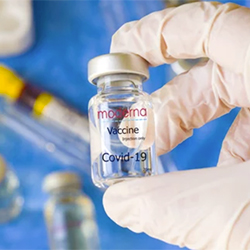By IDSE News Staff
Moderna said it would seek an expanded emergency use authorization from the FDA and global regulatory authorities for its COVID-19 messenger RNA (mRNA) vaccine after reviewing interim results from its phase 2/3 KidCOVE study.

This interim analysis of two age groups (6 to <24 months; 24 months to <6 years) showed a robust neutralizing antibody response after a 25-mcg two-dose primary series of mRNA-1273, along with a favorable safety profile.
KidCOVE (ClinicalTrials.gov Identifier: NCT04796896) is a randomized, observer-blind, placebo-controlled study to evaluate the safety, tolerability and immunogenicity of two doses of mRNA-1273 given to healthy children 28 days apart. The study population is divided into three age groups (6 to <12 years; 24 months to <6 years; and 6 to <24 months).
Overall, the company has enrolled approximately 11,700 children in the United States and Canada into the trial, including approximately 4,200 children ages 24 months to 5 years and approximately 2,500 children ages 6 to 23 months. Approximately 6,700 participants between 6 months and 5 years of age were enrolled into this age cohort.
In both age groups, the tolerability profile was generally consistent with that observed in children 6 to 11 years of age, in adolescents aged 12 to 17 years and in adults. Most adverse events were mild or moderate and were more frequently reported after dose 2.
Rates of fever greater than 38° C among vaccine recipients were consistent with other commonly used and recommended pediatric vaccines: 17.0% and 14.6% in the age groups of 6-24 months and 24 months to 5 years, compared with 23.9% in children aged 6 to 11 years, who received a 50-mcg two-dose primary series. Fever greater than 40° C was seen in only a few children (0.2% in each age group).
No study pause rules were met, and no new safety concerns were identified in either age group. No deaths, myocarditis or pericarditis, and multisystem inflammatory syndrome in children were reported.
In both age groups, two doses of 25 mcg provided similar immunogenicity to the 100-mcg two-dose primary series in adults ages 18 to 25 years, meeting the noninferiority criteria and immunobridging, which indicate the benefit of mRNA-1273 conferred to adults ages 18 to 25 are also conferred to children and infants as young as 6 months.
Immunobridging infers effectiveness based on the immune response biomarker(s) elicited by the vaccine in the pediatric age group versus comparator group in which efficacy of the same vaccine was previously demonstrated, and presumes disease pathogenesis and mechanism of protection are similar across age groups, according to Doran Fink, MD, the deputy director, clinical, Division of Vaccines and Related Products Applications, Office of Vaccines Research and Review, FDA Center for Biologics and Evaluation, at an advisory committee meeting on June 10, 2021.
The SARS-CoV-2–neutralizing antibody geometric mean ratio comparing the response in children 6 to 23 months of age with the response in young adults from the phase 3 COVE study was 1.3 (95% Cl, 1.1-1.5) and 1.0 (95% Cl, 0.9-1.2) for children between 24 months and 5 years of age. This ratio also predicts protection from COVID-19 and severe COVID-19 disease down to 6 months of age.
The omicron SARS-CoV-2 variant predominated in the United States during the KidCOVE study in these younger age groups. The secondary end point of vaccine efficacy confirms statistically significant but lower efficacy against COVID-19 infection, as expected during the omicron wave and consistent with adult observational data. Using the phase 3 COVE study COVID-19 definition, vaccine efficacy in children 6 to 24 months was 43.7%, and vaccine efficacy was 37.5% in children 24 months to under 6 years of age. In this case, statistical significance is defined as a lower bound on the 95% CI, which is greater than 0. Most cases were mild, and no severe COVID-19 disease was observed in either age group. The absence of any severe disease, hospitalization or death in the study precludes the assessment of vaccine efficacy against these end points.
Similar to adults, Moderna is preparing to evaluate the potential of a booster dose for all children and adolescents. The company is evaluating booster doses of mRNA-1273 and its bivalent booster candidate (mRNA-1273.214), which includes the omicron variant booster and mRNA-1273.
“We believe these latest results from the KidCOVE study are good news for parents of children under 6 years of age. We now have clinical data on the performance of our vaccine from infants 6 months of age through older adults,” said Stéphane Bancel, the CEO of Moderna.
“Given the need for a vaccine against COVID-19 in infants and young children we are working with the U.S. FDA and regulators globally to submit these data as soon as possible. Additionally, after consultation with the U.S. FDA we have initiated a submission for emergency use authorization of our COVID-19 vaccine in children ages 6 to 11 years old and are updating our submission to the FDA for emergency use authorization of mRNA-1273 in adolescents ages 12 to 17 years with additional follow-up data. We remain committed to helping to end the COVID-19 pandemic with a vaccine for children of all ages,” he added.
Safety data continue to accrue, and the study continues to be monitored by an independent safety monitoring committee. All participants will be monitored for 12 months after their second injection to assess long-term protection and safety. These data are subject to change based on ongoing data collection. The company plans to submit these data to a peer-reviewed publication.
Moderna previously reported positive top-line data from the 6- to under 12-year-old cohort, indicating a strong immune response one month after the second dose.
The KidCOVE study is being conducted in collaboration with the National Institute of Allergy and Infectious Diseases and the Biomedical Advanced Research and Development Authority.
{RELATED-HORIZONTAL}
